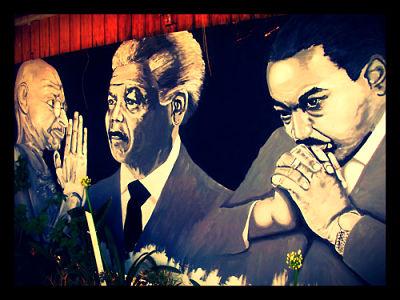Heroes of Advocacy
 Every wrong in the world has been addressed and corrected through some kind of advocacy, the most prominent kind of which is social advocacy. Well-known leaders throughout time from all over the world have led social movements, revolutions, and non-violent protests all in the face of injustice. Here are some of the most influential social leaders; the heroes of advocacy:
Every wrong in the world has been addressed and corrected through some kind of advocacy, the most prominent kind of which is social advocacy. Well-known leaders throughout time from all over the world have led social movements, revolutions, and non-violent protests all in the face of injustice. Here are some of the most influential social leaders; the heroes of advocacy:
- Mahatma Gandhi: Named “Mahatma” by one of India’s best-known writers, Tagore; the title ‘Mahatma’ stood for ‘Great Soul.’ It was in South Africa, while serving as an Indian businessman’s legal adviser, that he became aware of European racism and injustice. While in South Africa, Gandhi found himself “politically awakened” and began to use non-violent strategies to fight injustice. He wrote a book about the Indians’ struggles to claim their rights in South Africa. He returned to India in 1915 and found himself involved in several local struggles involving workers and working conditions. He then went on to initiate the non-cooperation movement, advising Indians to be self-reliant and withdraw from British institutions. In February 1922, when Indian policemen were killed by a crowd, Gandhi was arrested, and the movement was suspended. At his ‘Great Trial,’ where he was tried for sedition, he delivered a powerful indictment of British rule. After his release from prison, he worked hard towards maintaining relations between Hindus and Muslims in India. Gandhi was the most prominent figure in his engagement in the constructive reform of Indian society. Gandhi used “satyagraha,” systems of non-violence, to try and make the oppressor and the oppressed identify with one another as humans. Gandhi recognized that “freedom is only freedom when it is indivisible.”
- Nelson Mandela: Born in Transkei, South Africa, Mandela joined the African National Congress in 1944 and engaged in resistance against the racist apartheid government of the ruling National Party. The African National Congress sought to create democratic political change in South Africa. In 1956, he was tried for treason. It was during his time in prison on Robben Island, from 1964 to 1982, that Mandela’s reputation became more famous. “He consistently refused to compromise his political position to obtain his freedom.” Upon his release from prison in 1990, he dedicated himself to achieve the goals that were sought after four decades earlier. In 1991, he was elected President of the African National Congress (ANC). He was awarded the Nobel Peace Prize in 1993 for his work for the “peaceful termination of the apartheid regime, and for laying the foundations for a new democratic South Africa” – Official Nobel Prize Website
- Martin Luther King Jr.: Known for boycotts, demonstrations and civil movements to express civil disobedience, King was the symbol of a nonviolent civil rights revolution. He changed politics. According to The King Center, African Americans achieved “more genuine racial equality” under the leadership of Dr. King with the American Civil Rights Movement than they did before him. King was heavily influenced by his Christian faith and the teachings of Gandhi, both of which guided him to lead nonviolent movements in the 1950s and 60s to achieve African American equality in the United States. Martin Luther King was quoted during his delivery of the “I Have a Dream” speech, saying that African Americans were still not free, that they still lived in poverty and segregation, that they are exiles, and so now they had to “dramatize a shameful condition.” This is precisely what the Borgen Project is doing by fighting global poverty.
- César Chávez: The Mexican-American who brought on agricultural reform and whose works led to the creation of the National Farm Workers Association, later named the United Farm Workers. He witnessed the harsh labor conditions that farmers had to endure and the employers’ exploitation of workers: they were unpaid, had poor living conditions in return for their services and had no medical or basic privileges. He organized marches, boycotts and strikes, forcing employers to provide adequate payment/wages to workers and provide them with benefits. Chávez was recognized for his commitment to social justice and was awarded the Presidential Medal of Freedom.
There are many more social activists or heroes of advocacy who dedicated their lives to social reform and political change by fighting for people’s rights and freedoms. The activists listed above were a few of the most prominent and most influential throughout history.
Today, we’re fighting for a different kind of freedom, although it is not any less important: we’re fighting to end global poverty and free people from the shackles of poverty. Martin Luther King Jr. once said, “Injustice anywhere is a threat to justice everywhere,” during his fight for equal rights for colored people in the United States.
With advocacy, we deliver information and vital knowledge to the masses, thereby engaging them and mobilizing them to stand up for an issue and demand justice as the heroes of advocacy did.
– Leen Abdallah
Sources: Gandhi, Nelson Mandela: Biography, Mandela: Nobel Peace Prize, The King Center, I Have a Dream, Nobel Peace Laureates
Photo: Daily Good
